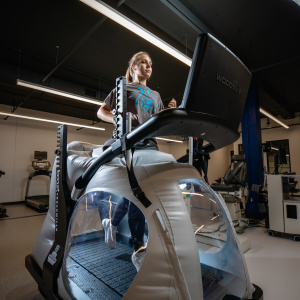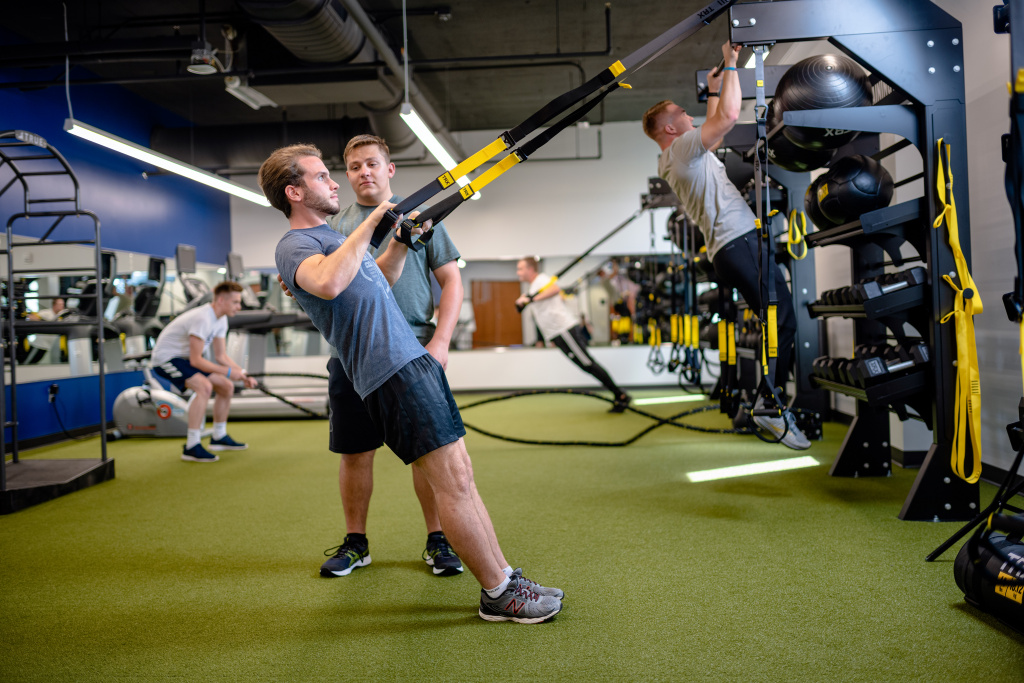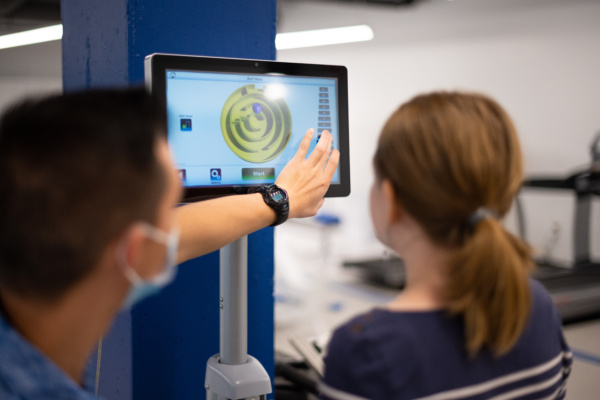If you are interested in the human body, physical health and helping people, then Bob Jones University’s kinesiology program might be a good fit. “Because we’re designed by God with the body, we have a responsibility to take care of the body in order to glorify God,” said Dr. Stephen Chen, chair of the Division of Exercise and Sport Science.
As a kinesiology major, you will take on the responsibility of helping others improve their physical functions — whether it’s helping an athlete improve their performance or helping a patient recover from surgery. Through hands-on experience and rigorous coursework, students will be equipped to enter an exercise- or sports-related industry or graduate school.
The kinesiology program has two concentrations — sports medicine and rehabilitation and exercise physiology. Those in the sports medicine and rehabilitation track typically go on to graduate school and afterward enter occupations such as physical therapist, chiropractor, clinical researcher and prosthetist. Those in the exercise physiology track enter occupations such as personal trainer, health educator and corporate fitness director.
What Classes Will I Take?
As a freshman, you will receive your first taste of kinesiology in anatomy and physiology. Taught by Dr. Marc Chetta, you will get a detailed overview of the human body and its various systems. “All students in kinesiology need to have a solid background in science,” Chen said.
In order to fix a physical problem, prescribing a program, you have to understand the human body. “I like the example of, if you like cars, and you want to be able to improve your car, you have to know the inside before you can fix it or improve it,” Chen said.
You’ll also take biomechanics, which includes a project where you will record and analyze a movement in sports. You will have to identify the stages in the movement and all of the muscles involved in each step.
What Electives Should I Take?
Because kinesiology students often set up their own practices, programs or clinics, Chen recommends that students take a few business electives. Spanish electives can also be helpful. He also recommends psychology courses, as insight into how the mind functions is relevant knowledge.
What Resources will be Available to Me?
 As a kinesiology major, you will have access to the human performance lab and the fitness and wellness lab. In the human performance lab, you will learn how to do performance, health and fitness assessments. The lab is equipped with equipment to help with cardiovascular fitness, muscular strength and flexibility. There is also equipment that measures body composition and balance as well as therapy equipment.
As a kinesiology major, you will have access to the human performance lab and the fitness and wellness lab. In the human performance lab, you will learn how to do performance, health and fitness assessments. The lab is equipped with equipment to help with cardiovascular fitness, muscular strength and flexibility. There is also equipment that measures body composition and balance as well as therapy equipment.
Assessments can help you know what the problem is with your patient. Once you know the problem, you will be able to prescribe a program based on that assessment.
The fitness and wellness lab is a studio for training with clients as well as teaching fitness classes.
See Also: Broader Benefits, Outreach Outlined with New Facility
What Experiential Learning Activities Will I Have?
Kinesiology offers several hands-on learning experiences.
Internship
All kinesiology students are required to do a semester-long internship off campus. “We have 65 sites established here in Greenville, or nearby, where students can select a site based on their career interests,” Chen said.
Practicum
Practicum is required for all students in the exercise and physiology track. As an upperclassman, you will be assigned a client and conduct a one-on-one personal training program that includes before and after assessments.
See Also: Program Practicum Benefits Student, Class Participants
Other Opportunities
There is an independent study class, where you will be able to assist professors in lab research. You can also gain experience with teaching fitness classes in the fitness and wellness lab.
Are There Any National Tests I’ll Have To Take?
There are no required national tests for kinesiology majors. However, if you are in the exercise and physiology track, you will take a class called preparation for certification. Students have received their certification in nationally recognized certifications such as NSCA: Certified Strength and Conditioning Specialist and ACSM: Certified Exercise Physiologist.
What Kind of Jobs Are Available After Graduation?
There is an array of exercise science-related occupations, including physical therapist, chiropractor, clinical exercise physiologist, strength and conditioning specialist and recreation therapist. With an aging North American population, the need for health care professionals in multiple areas is increasing.
“I think it’s an exciting platform because we need more Christian fitness and health care professionals,” Chen said.








